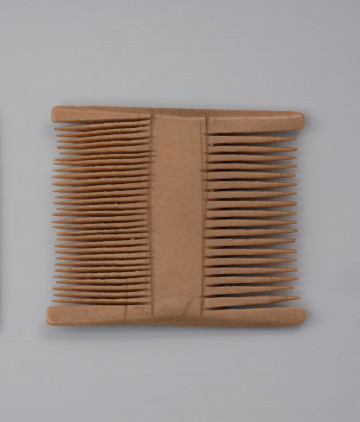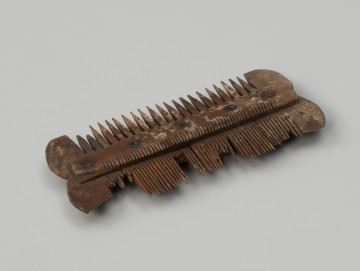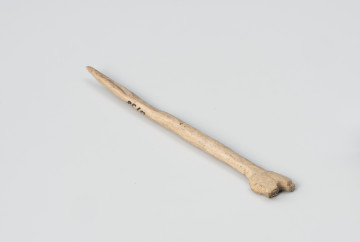
Antler comb
476 — 1250
National Museum in Szczecin
Part of the collection: Middle Ages
Combs are some of the oldest, and certainly timeless items used by man to maintain hygiene. Both in the unilateral form we know today and the now rarer bilateral form, they are already found on archaeological sites dating back to the Neolithic period. They were primarily used for cleansing oneself from parasites, combing or styling hair. They were also used as a decorative element to prop up hairstyles. With the development of weaving and spinning, from the Neolithic to the present day, they were also used for combing wool or flax. Most often, however, weaving combs were narrower and had elongated teeth. It is also believed that a type of comb was one of the oldest tools used to decorate ceramic vessels. In modern times, combs are made from plastics such as epoxy resins, rubber, silicones and carbon fibres. However, more noble materials, such as wood, iron, bronze, ivory or, in the case of the oldest combs, antlers and bone, are found in archaeological digs. The presented, partially preserved single-sided comb was found during excavations carried out in 1962 in Kamień Pomorski (West Pomeranian Voivodeship). It is made of antler, with at least eight elements – six plates with notched teeth and two, bonding them, arched facings fixed with rivets. Its toothed plates are characterised by wavy edges, protruding above the back of the facings, decorated with a row of holes. On the straight edges of the comb, however, there are holes used to secure it in a sheath which, being a structural element, protected the working part from breaking off. Grzegorz Durdyń
Author / creator
Object type
comb
Technique
planing, cutting, curving (engraving), drilling
Material
antlers
Origin / acquisition method
field research
Creation time / dating
Creation / finding place
Owner
Muzeum Narodowe w Szczecinie
Identification number
Location / status

476 — 1250
National Museum in Szczecin

1176 — 1200
National Museum in Szczecin

800 — 1200
National Museum in Szczecin
DISCOVER this TOPIC
National Museum in Lublin
DISCOVER this PATH
Educational path